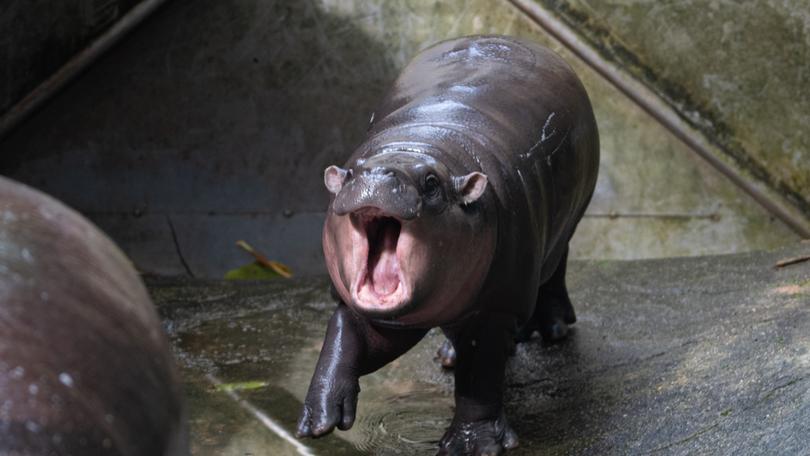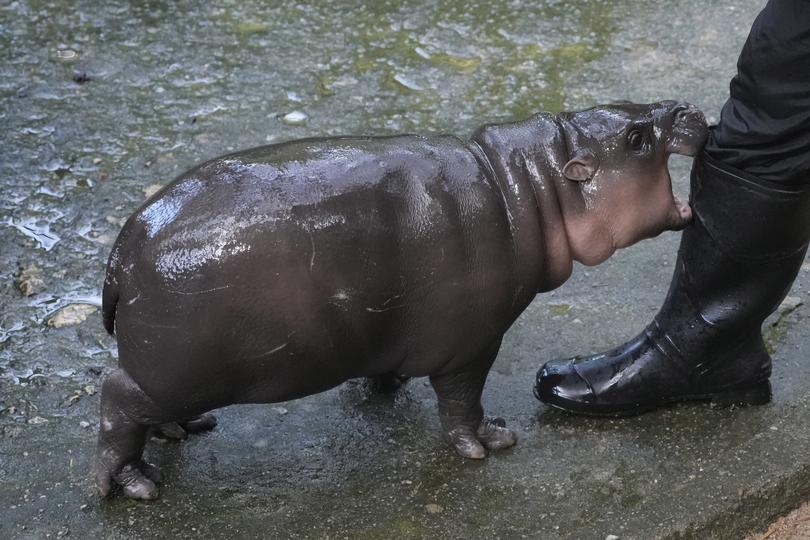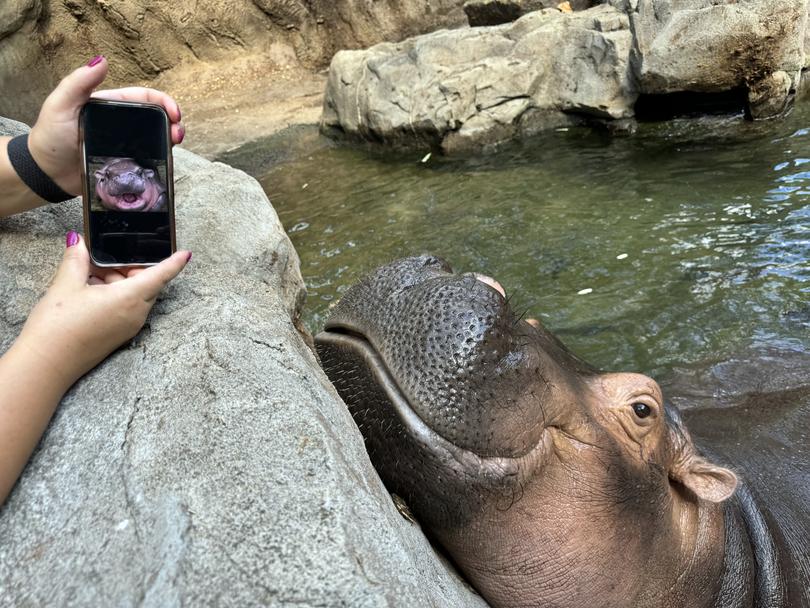Moo Deng: Pygmy hippo named after ‘bouncy pork’ is stealing hearts and biting zookeepers
If you have yet to come across the internet’s favourite pygmy hippopotamus, then it’s time to meet Moo Deng. She’s a bit of a diva.

Defiant, sassy, slippery, chubby, loves to scream. We can all relate.
If you have yet to come across the internet’s favourite pygmy hippopotamus, then meet Moo Deng. She’s a bit of a diva.
“The hottest, hottest new It girl on the planet,” Hoda Kotb, a co-anchor on the “Today” show, said during a recent episode. “She’s redefining beauty standards: She’s got chubby pink cheeks, a distinct potato shape.”
Sign up to The Nightly's newsletters.
Get the first look at the digital newspaper, curated daily stories and breaking headlines delivered to your inbox.
By continuing you agree to our Terms and Privacy Policy.Since Moo Deng’s public introduction by the Khao Kheow Open Zoo in Chon Buri, Thailand, south of Bangkok, on July 25, when she was 2 weeks old, her star has only risen.
Her name, which translates to “bouncy pork,” was chosen by a poll held on the zoo’s Facebook page; around 20,000 people voted. There were three options: Moo Deng, Moo Sap (minced pork) and Moo Daeng (red pork). Moo Deng won easily.
Atthapon Nundee, Moo Deng’s keeper at the zoo, began sharing content about the pygmy hippo on social media immediately. “I think I am close with her to the point I can share lovely day-to-day activities,” he said in an email.
“Most people like that and watching her grow up.”
But it was Yammi Saracino, a ceramicist and content creator born in Bangkok, who is at least partially responsible for the hippo’s initial international fame. When he saw the zoo’s Facebook poll, he felt compelled to translate it into English so that a broader audience would find her.
“The winner clearly was Moo Deng,” he said.
“I think that partially had something to do with me, because I was like, ‘I’m voting for this name, so help me vote for this name.’”

Interest outside the zoo has been huge ever since, with the young pygmy hippo being mentioned by companies, sports teams, public transit, buildings, an encyclopedia and meme lovers all over the world. There is even a cryptocurrency that bears her likeness.
The whole adventure has raised awareness for pygmy hippopotamuses, which are smaller and more land-loving than the common hippo. They are native to the swamps and forests of West Africa and there are fewer than 3,000 of the animals in the wild.
That being said, Moo Deng is not the only one to gain internet fame: Toni, a pygmy hippo at Zoo Berlin, also had people talking this summer. But Saracino believes Moo Deng has been able to stand out, thanks to her cuteness and spunky personality.
“Moo Deng specifically, even in comparison to her siblings, is really bouncy and really feisty,” he said.
“She has no teeth but is adamant about biting her keeper.” (This is probably because Moo Deng is teething, according to Mr Nundee, Moo Deng’s keeper.)
There is hope among the staffs at the zoos involved that the starring role that Moo Deng and Toni have played could have a positive long-term effect for other pygmy hippos.
“With their childlike behaviour, baby animals have the wonderful potential to draw even greater attention to endangered animal species,” said Philine Hachmeister, the deputy head of communications and marketing at Zoo Berlin.
“Animals help to build a bridge and are a good introduction to the complex interrelationships of nature.”
All of the attention on Moo Deng has also, unfortunately, come with a few bumps.
After tourists began throwing things at her enclosure in hopes of waking her, the zoo had to limit viewing times at Moo Deng’s enclosure to 10 to 15 minutes and enhance the road to accommodate the amount of traffic, said Narongwit Chodchoi, the zoo’s director.
Recently, however, visitors have been respectful and have followed the zoo’s instructions, members of the zoo’s staff said in an email.
But Moo Deng seems to be handling the fame fine. “For the mental health, I build trust with Moo Deng by engaging in conversation,” Mr Nundee said, adding that he calls her by her name and makes physical contact with her.
If all of this sounds at least a little familiar, it may be because in 2017, another baby hippo took the internet by storm. In January of that year, the Cincinnati Zoo announced the premature arrival of Fiona, a common river hippopotamus, and proceeded to post photos daily at noon for the clamouring public.
“We definitely didn’t always know she would be a star,” said Jenna Wingate, the head keeper of the Africa department at the Cincinnati Zoo.
“But we figured it out pretty quickly.”
Just like Moo Deng, Fiona saw her popularity grow online, as did the demand for zoo tickets and viewings. In response, the Cincinnati Zoo started “Hanging With Hippos,” an up-close-and-personal tour.
“We equate it to people trying to get Taylor Swift tickets,” Wingate explained. “They’ll log in on their iPad, their phone and their computer.”
Zoo staff thought Fiona’s popularity would wane as she grew out of her adolescent stage, but seven years later she is still generating lines of people waiting to see her and buy her branded merchandise, with the fame helping generate more than $1 million for the zoo, allowing it to assist in worldwide conservation efforts for hippos.

The Khao Kheow Open Zoo hopes to do similar work, using its profits to give back to research and conservation efforts both inside and outside of the zoo.
But while Fiona may be the original hippo It girl, zoo staff said she was happy to share the spotlight. “Fiona loves everyone, she would love to see Moo Deng doing her thing,” Wingate said.
“Pygmy hippos are much more endangered than common or Nile hippos, and I think if this sparks interest in one person to grow up to be a conservationist and that makes a difference for them, that’s incredible.”
So what’s next for Moo Deng? She’s staying just as sassy.
“Her behaviour may change depending on mood because now she is a superstar,” Mr Nundee said.
The Khao Kheow Open Zoo said it was planning to trademark “Moo Deng the hippo.” The zoo released a line of clothing featuring the hippo’s likeness, selling out almost immediately, and set up a 24-hour livestream.
Saracino doesn’t see an end in sight, especially in Thailand. He plans to visit Moo Deng in the coming months. “I don’t think it’s reached its peak yet,” he said of the hippo’s popularity. “She’s ours, we love her.”
This article originally appeared in The New York Times.
© 2024 The New York Times Company
Originally published on The New York Times
